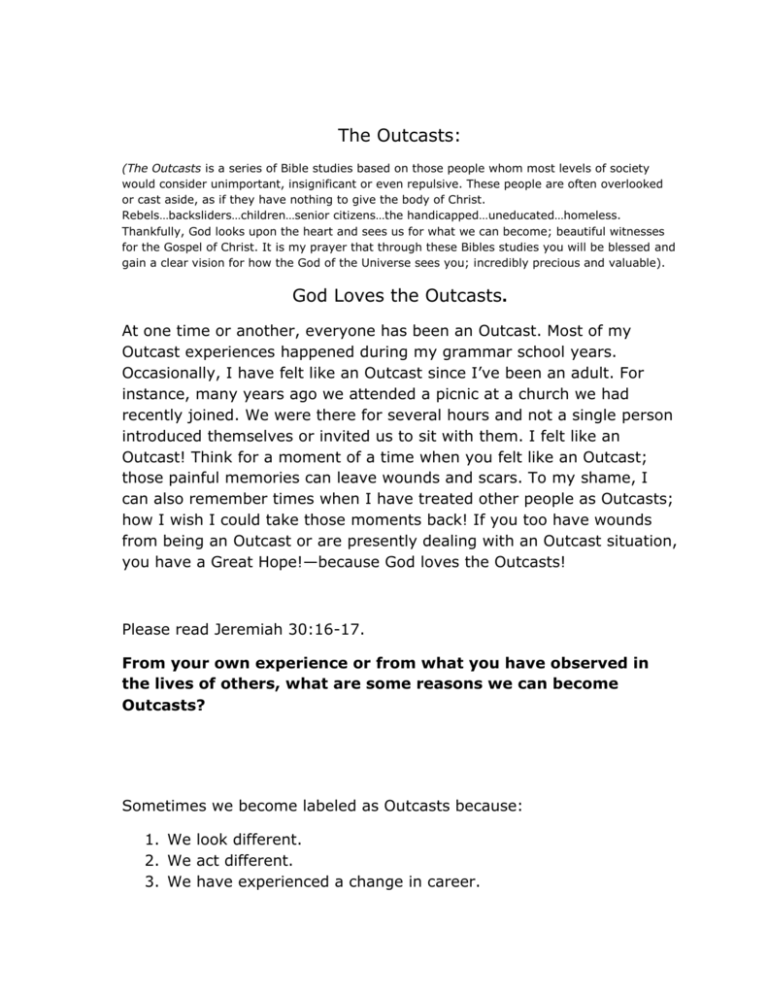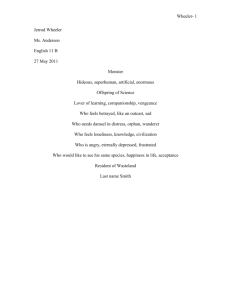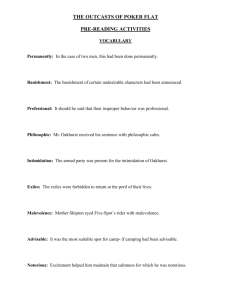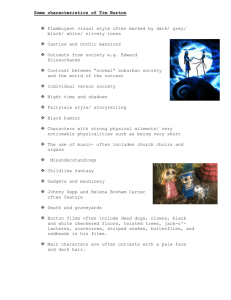
The Outcasts:
(The Outcasts is a series of Bible studies based on those people whom most levels of society
would consider unimportant, insignificant or even repulsive. These people are often overlooked
or cast aside, as if they have nothing to give the body of Christ.
Rebels…backsliders…children…senior citizens…the handicapped…uneducated…homeless.
Thankfully, God looks upon the heart and sees us for what we can become; beautiful witnesses
for the Gospel of Christ. It is my prayer that through these Bibles studies you will be blessed and
gain a clear vision for how the God of the Universe sees you; incredibly precious and valuable).
God Loves the Outcasts.
At one time or another, everyone has been an Outcast. Most of my
Outcast experiences happened during my grammar school years.
Occasionally, I have felt like an Outcast since I‟ve been an adult. For
instance, many years ago we attended a picnic at a church we had
recently joined. We were there for several hours and not a single person
introduced themselves or invited us to sit with them. I felt like an
Outcast! Think for a moment of a time when you felt like an Outcast;
those painful memories can leave wounds and scars. To my shame, I
can also remember times when I have treated other people as Outcasts;
how I wish I could take those moments back! If you too have wounds
from being an Outcast or are presently dealing with an Outcast situation,
you have a Great Hope!—because God loves the Outcasts!
Please read Jeremiah 30:16-17.
From your own experience or from what you have observed in
the lives of others, what are some reasons we can become
Outcasts?
Sometimes we become labeled as Outcasts because:
1. We look different.
2. We act different.
3. We have experienced a change in career.
4. We have experienced an economic setback.
5. We have sin issues.
6. We have different customs and traditions.
7. We have health issues.
8. We practice a different religion.
9. We have experienced a change in marital status.
10. We have reached a certain age.
In general, we can become an outcast due to sinful choices… or Godly
choices; perhaps God has called you to make radical changes in your life
and those changes cause others to shun you. We may suddenly lose our
savings or job and find we are no longer “fit in” with our usual group of
friends. Possibly, due to an unexpected health challenge we may find
ourselves alone. There are many other reasons why a person may
become an Outcast.
Please write any other circumstances you can think of or have
experienced in which one may become an Outcast.
The word Outcast in the original language is nadach which means “to
impel, to thrust away, to banish, to drive away, a wife who has been set
aside by her husband, to be chased or hunted, one who is non-existent,
a neglected one (emphasis mine). One who is non-existent is
particularly painful; it‟s terrible to be deliberately ignored.
How can an Outcast be driven away?
An Outcast can be driven away by words, by silence, or by force. While
our words and actions can be powerful weapons used to drive others
away, our silences can be very effective (and hurtful) as well.
According to verse 16, what two things do our enemies seek to
do to us when they treat us as an Outcast?
They seek to devour and plunder the Outcasts. Plunder means to steal
something from someone. John 10:10 states that the Enemy‟s main
mission in life is to kill, steal and destroy. If Satan can convince us to
believe that we are Outcasts, undeserving of blessing or favor, we will
be easy targets for plundering.
What will our enemies try to steal from us?
They will try to steal what God has given us: dignity, gifts, grace, hope,
our calling, our testimony, our ministry and the “abundant life.”
Why does Satan want to steal these things?
There are many reasons why Satan seeks to steal from us, but the most
important reason is so we will become ineffective for the Kingdom of
God. If Satan can convince us that we are Outcasts with nothing to
offer, we will cease to be a threat to him and his evil plans.
Who are our enemies?
Satan and his demons are our enemies. In some instances, unbelievers
and other believers can become our enemies as well. The Hebrew word
for enemies is tsar which means “narrow, tight, distress, a foe or
oppressor, a hard pebble or flint.” From these definitions we can infer
that:
Our enemies want to put us in a box; they want to trap us into
thinking that we will never be able to accomplish anything for
God.
The Enemy of our soul wants us to think small, pray small,
believe small, live small and stay small.
Our enemies also want us to believe that what they say about us
is truth; their words are as sharp as flint and sting as the blow
from a stone. If we choose to listen to what our enemies say, we
will never fulfill God‟s will for our lives.
We have a choice to make then; we can either listen to the voice of the
Enemy who speaks lies or we can listen to the voice of God who speaks
truth.
How can you turn off the voice of the Enemy?
When he comes to you with his hurtful attacks, shut him down with
scripture! If Satan tempts you to believe that you are too stupid to be
used by God state out loud, “God‟s Word says that „He will give wisdom,
liberally and without reproach‟ to anyone who asks.” Counter the attacks
of Satan with the Word of God.
Ultimately, what shall happen to our enemies (verse 16)?
While Satan and his cronies seek to steal from the Outcasts,
what does God seek to do (verse 17)?
Thankfully, He seeks to restore and heal us. The Hebrew
word used in this verse for restore is „arukah which means
healing, restoration, health, and perfected. „arukah is
derived from another Hebrew word „arak which means to
prolong, to make sound, “the new flesh that grows at the wounded
spot.” Recently my nephew, Jesse, as many of you may know, was
burned in a terrible accident. As part of the healing process, Jesse
endured several excruciating debriding baths. The doctors told my sister
and her husband that the pain was a good sign…it signified that the
tissue was still living. The doctors also wrapped his burned legs and arm
in special silver colloidal bandages. On the day that he was scheduled to
have skin graft surgery, the doctors removed the bandages to discover
that skin grafts were no longer necessary as “new flesh was growing in
the wounded spot”! If Jesse had decided not to go to the hospital for
treatment, his outcome would have been very different; he most likely
would have developed a life-threatening infection. We have the same
choice to make concerning our wounds. We can either choose to hide
them and try to tend to them ourselves, threatening our health or we
can surrender them to God; He promises to heal our wounds so they will
no longer have the power to hurt us.
The original word used for wounds in this text can imply the worst kind
of wounding such as “slay, slaughter, scourging, beating, blows, stripes,
plague, disease, destroy, ravage, punish, and judgment.”
Please go back and circle the parts of the definition for wounds
that mean the most to you.
Please comment on why these definitions are meaningful.
Perhaps you‟ve been horribly hurt by the actions or words of another or
perhaps you‟ve been horribly hurt by your own mistakes, God wants you
to know that He is waiting to heal your wounds no matter how severe or
how deep or how old the wounds. He promises that He will heal you if
you will bring your wounds to Him.
Sometimes a person is healed very quickly; I have heard testimonies of
people being healed instantly from drug and alcohol addictions at the
moment of salvation. Other people are healed over time; my son
Scottie‟s broken collar bone took months to heal. In either case, God
wants us to use our healing as an occasion to bring Him glory!
Name one experience or issue that you want God to heal.
Healing requires work! It can also be painful and require patience, as
Jesse and Scottie experienced. Ask God to give you the energy,
endurance and grace you need to be healed.
Please write the last half of verse 17 in the space provided.
The NKJV states, “…because they called you an Outcast saying; „this is
Zion; no one seeks after her.‟ ” In essence, the phrase “no one seeks
after her” means “no one cares enough to see how someone is doing.”
That is never true of you; while it may seem that no one cares about
you, your Heavenly Father loves you intensely and is constantly
watching over you. He never sleeps or slumbers! He is continually
available to you through prayer, through His Holy Word and through
fellowship with the Body of Christ.
In closing, if you find yourself wearing the garments of an Outcast at
this point in your life what should you do?
1. Pray. Ask God to give you His wisdom and to guide you through
this tough time. Ask Him in particular to guard your mind from the
lies of the enemy.
2. Seek God. Pour yourself into His Word…join a Bible study
class…listen to sound Biblical teaching on the radio. Turn off the
TV and spend extra time in His Word. Ask Him to give you a
special verse from His Word to encourage you during this season.
3. Pray for Godly friends. Ask God to bring someone to you who
will be an encouragement. God‟s Word promises that a friend is
born in a time of need.
4. Let God be your defense. You do not need to defend yourself.
Let God take care of your enemies while you keep your focus on
Him.
5. Seek His healing and restoration. As we learned from verse 17,
God is waiting to heal you—your healing can begin today!
“For thus says the Lord of Hosts:
He who sent Me after glory, to the nations which plunder you;
For he who touches you touches the apple of His eye.”
Zechariah 2:8
To God you are never an Outcast—you are the Apple of His Eye. God
loves you.
By Mary Kane
All rights reserved
Copyright 2010






![【我們是你的百姓】 [ We are Your people ] 新歌頌揚377 我們屬於祢都](http://s2.studylib.net/store/data/005298903_1-fa3ea08f8bad91a00d5f15d00abd2df9-300x300.png)


